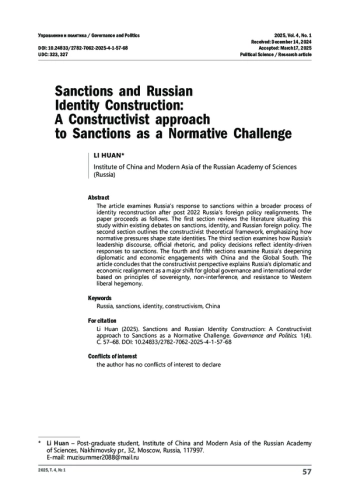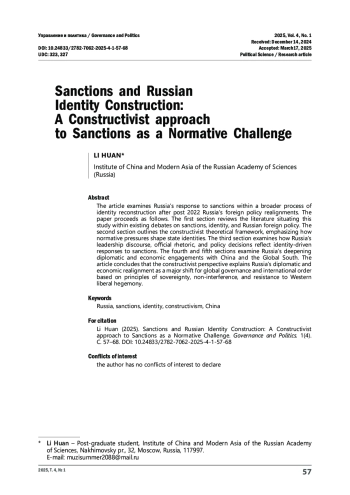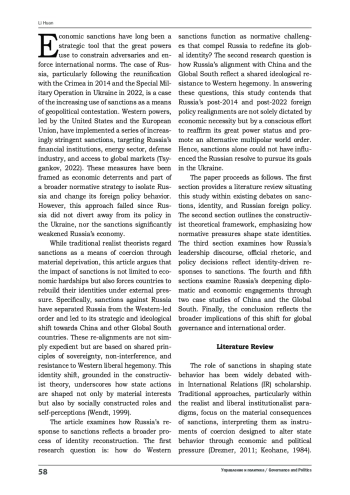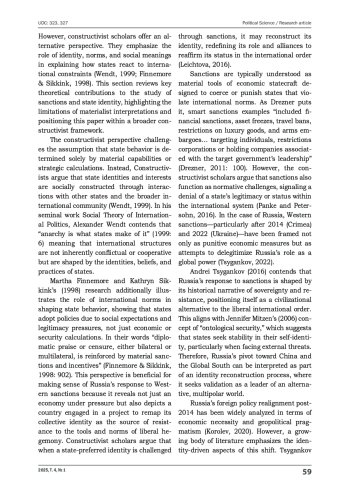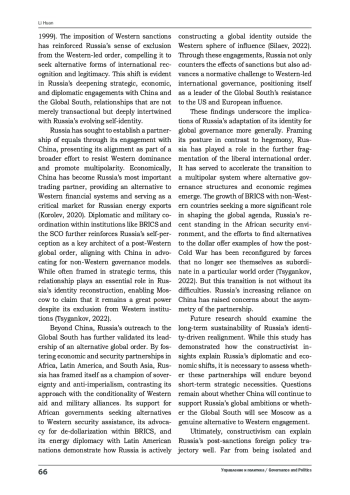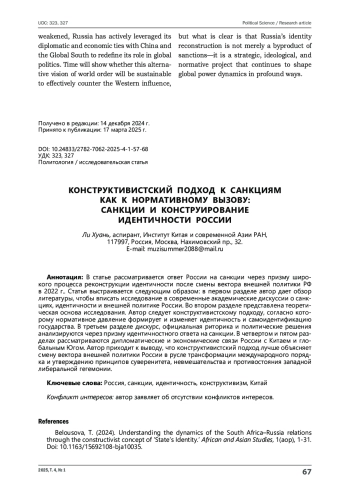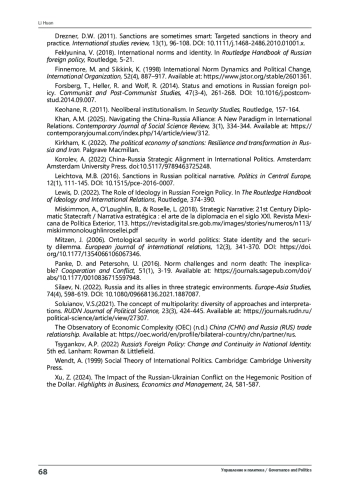1. Belousova, T. (2024). Understanding the dynamics of the South Africa-Russia relations through the constructivist concept of ‘State’s Identity.’ African and Asian Studies, 1(aop), 1-31. https://doi.org/10.1163/15692108-bja10035.
2. Drezner, D.W. (2011). Sanctions are sometimes smart: Targeted sanctions in theory and practice. International studies review, 13(1), 96-108. https://doi.org/10.1111/j.1468-2486.2010.01001.x.
3. Feklyunina, V. (2018). International norms and identity. In Routledge Handbook of Russian foreign policy, Routledge, 5-21.
4. Finnemore, M. and Sikkink, K. (1998) International Norm Dynamics and Political Change, International Organization, 52(4), 887-917. Available at: https://www.jstor.org/stable/2601361.
5. Forsberg, T., Heller, R. and Wolf, R. (2014). Status and emotions in Russian foreign policy. Communist and Post-Communist Studies, 47(3-4), 261-268. https://doi.org/10.1016/j.postcomstud.2014.09.007.
6. Keohane, R. (2011). Neoliberal institutionalism. In Security Studies, Routledge, 157-164.
7. Khan, A.M. (2025). Navigating the China-Russia Alliance: A New Paradigm in International Relations. Contemporary Journal of Social Science Review, 3(1), 334-344. Available at: https://contemporaryjournal.com/index.php/14/article/view/312.
8. Kirkham, K. (2022). The political economy of sanctions: Resilience and transformation in Russia and Iran. Palgrave Macmillan.
9. Korolev, A. (2022) China-Russia Strategic Alignment in International Politics. Amsterdam: Amsterdam University Press. https://doi.org/10.5117/9789463725248.
10. Leichtova, M.B. (2016). Sanctions in Russian political narrative. Politics in Central Europe, 12(1), 111-145. https://doi.org/10.1515/pce-2016-0007.
11. Lewis, D. (2022). The Role of Ideology in Russian Foreign Policy. In The Routledge Handbook of Ideology and International Relations, Routledge, 374-390.
12. Miskimmon, A., O’Loughlin, B., & Roselle, L. (2018). Strategic Narrative: 21st Century Diplomatic Statecraft / Narrativa estratégica : el arte de la diplomacia en el siglo XXI. Revista Mexicana de Política Exterior, 113. https://revistadigital.sre.gob.mx/images/stories/numeros/n113/miskimmonoloughlinrosellei.pdf
13. Mitzen, J. (2006). Ontological security in world politics: State identity and the security dilemma. European journal of international relations, 12(3), 341-370. https://doi.org/10.1177/1354066106067346.
14. Panke, D. and Petersohn, U. (2016). Norm challenges and norm death: The inexplicable? Cooperation and Conflict, 51(1), 3-19. Available at: https://journals.sagepub.com/doi/abs/10.1177/0010836715597948.
15. Silaev, N. (2022). Russia and its allies in three strategic environments. Europe-Asia Studies, 74(4), 598-619. https://doi.org/10.1080/09668136.2021.1887087.
16. Soluianov, V.S.(2021). The concept of multipolarity: diversity of approaches and interpretations. RUDN Journal of Political Science, 23(3), 424-445. Available at: https://journals.rudn.ru/political-science/article/view/27307.
17. The Observatory of Economic Complexity (OEC) (n.d.) China (CHN) and Russia (RUS) trade relationship. Available at: https://oec.world/en/profile/bilateral-country/chn/partner/rus.
18. Tsygankov, A.P. (2022) Russia’s Foreign Policy: Change and Continuity in National Identity. 5th ed. Lanham: Rowman & Littlefield.
19. Wendt, A. (1999) Social Theory of International Politics. Cambridge: Cambridge University Press.
20. Xu, Z. (2024). The Impact of the Russian-Ukrainian Conflict on the Hegemonic Position of the Dollar. Highlights in Business, Economics and Management, 24, 581-587.
